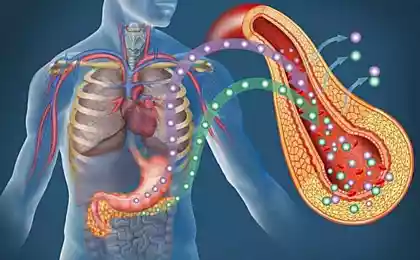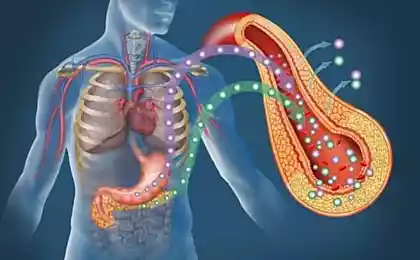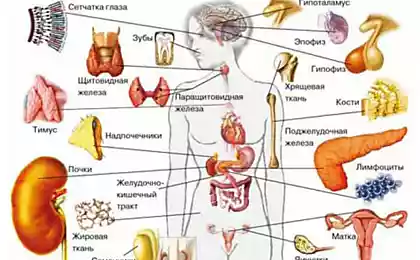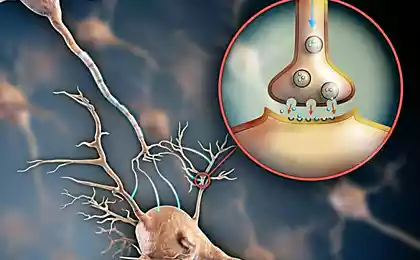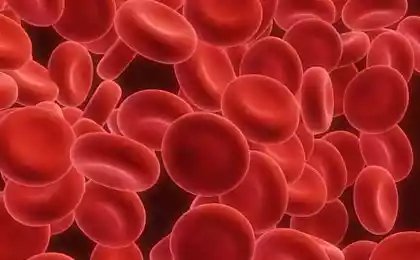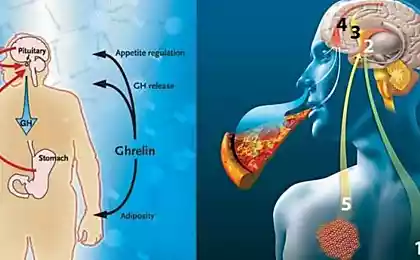705
What is a healthy person, who is OK to control the level of insulin in the blood?
What you need is a healthy person, which is all well and fine, control the level of insulin in the blood? After all, everything is fine, nothing bothers, why? The answer to such a simple question is: if a person cares about their health and tries as much as possible to stay young and active, he must keep under control the level of insulin in the blood.
The axiom is simple: "the normal amount of insulin in the blood prolongs life" and Vice versa, overdose or deficiency of insulin leads to obesity, aging and diabetes. It's impossible to stay young and healthy, when blood wander "excess" hormone or when its very little. Fortunately, this process can be easily controlled.
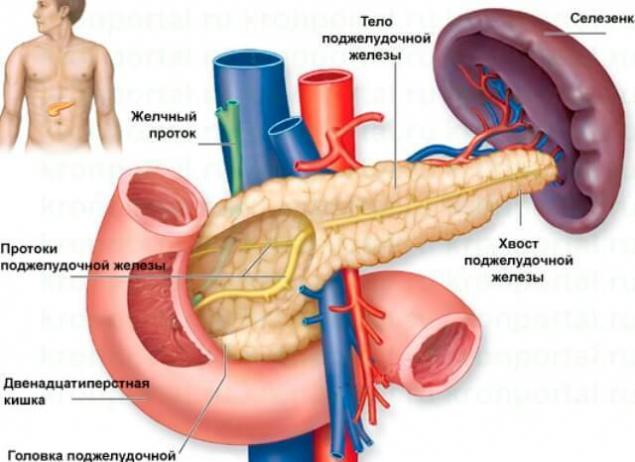
Insulin is a hormone, which is produced in the human pancreas. Its main task is the transport of glucose, amino acids, fats and potassium in the cells of the body. And also, its functions include maintaining normal and stable glucose levels in the blood and regulating carbohydrate balance of the body. So when the level of glucose in the blood increases and starts to exceed 100 mg/DL, at this point turns on the pancreas starting to produce insulin. Excess glucose and it binds transportorul them in some sort of store — muscle or fat tissue. Getting in muscle tissue, glucose is converted into energy to work, and if she was in the fat cells, it is converted to fat and accumulates in the body.
In normal amount of the hormone insulin is one of the important elements of the human body. Thanks to him, occur the following vital processes:
On the background of a chronically high level of insulin in the blood can develop diseases such as: heart attack, stroke, myopia, asthma, bronchitis, upper respiratory inflammation, impotence, ulcers. To avoid this kind of disease it is necessary to control the rate of release of insulin in the blood.
What limits on the content of insulin in the blood of a healthy person and how to define it?
The normal insulin range from 3 to 20 mked/ml. If the rate varies within acceptable limits a person is healthy. Important detail: the analysis on the content of insulin is carried out exclusively on an empty stomach. This is because after eating, the pancreas begins to function, producing insulin, so his blood will be higher than usual.
For young children this rule does not apply — the level of hormone in the blood does not change after a meal, only at the time of puberty the insulin to become dependent on the digestive process. If the amount of insulin in the blood exceeds the limit quite a long time — it could be a time bomb. Can develop related diseases of organs or entire vital systems and these processes are not reversible.
The excessive level of hormone in the blood depends on what the pancreas produces enough insulin, but it can not work as expected. The reasons why the following processes can be different: stress, excessive physical load, disease of the pancreas, diabetes mellitus.
Insulin as a hormone. With the increased level of insulin in the blood appear these symptoms: thirst, itching of the skin and mucous membranes, lethargy, weakness, fatigue, frequent urination, long not healing wounds on the skin, increased appetite with weight loss. If the concentration of insulin in the blood below normal, it indicates that the body is tired from exercise or a person is sick with diabetes of the first type. Insulin in diabetes type I low. Signs of low hormone levels in the blood can be the same as high, but they added: tremors, palpitations, pallor, anxiety, irritability, fainting, sweating, and sudden feelings of hunger.
The analysis on the content of insulin in the blood required for the evaluation of the pancreas, any failure in its work leads to increased or decreased hormone levels in the bloodstream. To determine in the laboratory the popular two kinds of analysis.
The first is a collection of blood on an empty stomach, last meal should take more than 8 hours. And then already precisely it is possible to determine the amount of blood.
The second type of analysis is the oral glucose tolerance test. The patient drinks on an empty stomach glucose, 75 g glucose dissolved in 250 -300 ml of water, and after 2 hours blood is taken for analysis and the amount of sugar in the blood. Then the conclusion is made about the amount of content of insulin in the bloodstream.
The most accurate result can be obtained with the combination of these two types of analysis: in the morning on an empty stomach is blood, then drink a glucose solution and two hours later, a second fence. The results of these two analyses give more information about the work of the pancreas. Prior to testing preferably the three day diet.
To determine the level of glucose in the body and in the home, this requires a meter. This is a special instrument for determining the amount of sugar in the blood, you can buy it at a pharmacy or medical supply store.
"Pomerania": exercise for weight loss
Headache — check the liver!
To accurately measure the blood sugar levels need to follow some rules:
Author: Olga Butakova
Source: butakova.info/blog/rol-insulina-v-organizme-cheloveka.html
The axiom is simple: "the normal amount of insulin in the blood prolongs life" and Vice versa, overdose or deficiency of insulin leads to obesity, aging and diabetes. It's impossible to stay young and healthy, when blood wander "excess" hormone or when its very little. Fortunately, this process can be easily controlled.

Insulin is a hormone, which is produced in the human pancreas. Its main task is the transport of glucose, amino acids, fats and potassium in the cells of the body. And also, its functions include maintaining normal and stable glucose levels in the blood and regulating carbohydrate balance of the body. So when the level of glucose in the blood increases and starts to exceed 100 mg/DL, at this point turns on the pancreas starting to produce insulin. Excess glucose and it binds transportorul them in some sort of store — muscle or fat tissue. Getting in muscle tissue, glucose is converted into energy to work, and if she was in the fat cells, it is converted to fat and accumulates in the body.
In normal amount of the hormone insulin is one of the important elements of the human body. Thanks to him, occur the following vital processes:
- This hormone builds up muscles. It activates ribosomes that produce protein synthesis. And the protein is known to be the building blocks of muscles.
- Prevents destruction of muscle fibers. Anti-catabolic (catabolism – the process of decay) properties of insulin is not less important than its anabolic properties.So this hormone protects and renews muscle tissue.
- Insulin supplies the muscle cells with amino acidsthat are necessary for their functioning.
- Increases the activity of enzymesresponsible for the stimulation of glycogen formation, which is the main storage form of glucose in body cells. And it is the decay releases energy necessary for vital activity of the cell and organism as a whole. Everything is fine, when insulin does not exceed the norm of maximum permissible boundaries, but if the number exceeds the limit, then this condition negatively affects human health. It can threaten diseases such as: obesity, diabetes of the 2nd type, disruption of the cardiovascular system.
- Inhibits lipase. Lipase is the enzyme that is responsible for the breakdown of fats (triglycerides) in the body. If there is no lipase, body doesn't burn fat tissue and accumulates. Resulting in increased fat mass.
- Enhances lipogenesis is the synthesis of fatty acids. Intense lipogenesis entails an increase in triglycerides, which activate the sebaceous glands, causing the skin to become more oily and may cause acne, seborrhea and dandruff.
- Destroys the arteriesthat leads to atherosclerosis of the circulatory system. The result of the disorders of lipid metabolism on the walls of blood vessels formed cholesterol plaques, resulting in the deformation of the artery wall and narrowing the lumen therein. Atherosclerosis can cause coronary heart disease.
- Raises blood pressure. The normal level of insulin in the blood, it has vasodilating properties. But if it's too much in the body, blood pressure increases. How does insulin increase in pressure, while it is not installed. There are suggestions that it acts on the regulation of the kidney and nervous system that cause blood vessels to narrow, resulting in rising blood pressure.
- Stimulates the growth of cancer cells. Insulin is a growth hormone, excessive amounts in the blood can lead to reproduction of malignant cells. Therefore, people suffering from excess insulin, are more susceptible to cancer.
On the background of a chronically high level of insulin in the blood can develop diseases such as: heart attack, stroke, myopia, asthma, bronchitis, upper respiratory inflammation, impotence, ulcers. To avoid this kind of disease it is necessary to control the rate of release of insulin in the blood.
What limits on the content of insulin in the blood of a healthy person and how to define it?
The normal insulin range from 3 to 20 mked/ml. If the rate varies within acceptable limits a person is healthy. Important detail: the analysis on the content of insulin is carried out exclusively on an empty stomach. This is because after eating, the pancreas begins to function, producing insulin, so his blood will be higher than usual.
For young children this rule does not apply — the level of hormone in the blood does not change after a meal, only at the time of puberty the insulin to become dependent on the digestive process. If the amount of insulin in the blood exceeds the limit quite a long time — it could be a time bomb. Can develop related diseases of organs or entire vital systems and these processes are not reversible.
The excessive level of hormone in the blood depends on what the pancreas produces enough insulin, but it can not work as expected. The reasons why the following processes can be different: stress, excessive physical load, disease of the pancreas, diabetes mellitus.
Insulin as a hormone. With the increased level of insulin in the blood appear these symptoms: thirst, itching of the skin and mucous membranes, lethargy, weakness, fatigue, frequent urination, long not healing wounds on the skin, increased appetite with weight loss. If the concentration of insulin in the blood below normal, it indicates that the body is tired from exercise or a person is sick with diabetes of the first type. Insulin in diabetes type I low. Signs of low hormone levels in the blood can be the same as high, but they added: tremors, palpitations, pallor, anxiety, irritability, fainting, sweating, and sudden feelings of hunger.
The analysis on the content of insulin in the blood required for the evaluation of the pancreas, any failure in its work leads to increased or decreased hormone levels in the bloodstream. To determine in the laboratory the popular two kinds of analysis.
The first is a collection of blood on an empty stomach, last meal should take more than 8 hours. And then already precisely it is possible to determine the amount of blood.
The second type of analysis is the oral glucose tolerance test. The patient drinks on an empty stomach glucose, 75 g glucose dissolved in 250 -300 ml of water, and after 2 hours blood is taken for analysis and the amount of sugar in the blood. Then the conclusion is made about the amount of content of insulin in the bloodstream.
The most accurate result can be obtained with the combination of these two types of analysis: in the morning on an empty stomach is blood, then drink a glucose solution and two hours later, a second fence. The results of these two analyses give more information about the work of the pancreas. Prior to testing preferably the three day diet.
To determine the level of glucose in the body and in the home, this requires a meter. This is a special instrument for determining the amount of sugar in the blood, you can buy it at a pharmacy or medical supply store.
"Pomerania": exercise for weight loss
Headache — check the liver!
To accurately measure the blood sugar levels need to follow some rules:
- Measurements are taken on an empty stomach.
- Before using the meter, you must read the user manual of the device, if you have any unclear point, please seek clarification from a specialist.
- Thoroughly wash hands is not only for disinfection, but the fact that the mechanical movement improve blood circulation in the body.
- Blood sampling can be done with the pads of three fingers: middle, ring and little finger. To reduce the painful puncture is recommended to do off-center pads, and a bit to the side. If you need to regularly measure blood sugar, the puncture site needs to be changed, to avoid inflammation or thickening of the skin. The first drop of blood with a dry cotton swab only the next drop is placed on a test strip. A strip to insert into the meter and the display will show the result of the analysis. According to the measurement it is already possible to conclude that the levels of insulin in the blood.published
Author: Olga Butakova
Source: butakova.info/blog/rol-insulina-v-organizme-cheloveka.html
How to achieve the installation of containers for hazardous waste from its management company
Russian physicists received the material for the nonvolatile memory of a new type





